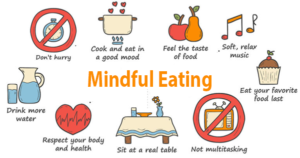Stress is an inevitable part of life, but how we manage it can make all the difference in our overall well-being. While exercise, mindfulness, and relaxation techniques play significant roles in stress management, the impact of nutrition should not be underestimated. The food we eat has a direct link to our physical and mental health, and making wise dietary choices can help us combat stress and its harmful effects. In this article, we will explore the relationship between nutrition and stress management, providing valuable insights into how you can nourish your way to a more stress-free life.
The Stress-Nutrition Connection
During stress, the body’s demand for energy increases and more nutrients are required. However, stress makes the body crave for foods that are high in sugar and fats & lacking in essential nutrients. These comfort foods temporarily reduce stress by triggering chemical reactions that can improve the mood. They provide a small burst of energy with spike in blood sugar levels followed by reduced blood sugar levels that can make someone exhausted and cranky. This, in time, inflicts a greater stress on the body and induce a state of nutrient depletion.
To balance blood sugar levels, focus on eating complex carbohydrates like whole grains, legumes, and vegetables, as well as lean proteins and healthy fats. These choices help stabilize blood sugar levels, provide a steady supply of energy & nutrients while reducing stress-related mood swings.
Incorporating Stress-Busting Nutrients
Certain nutrients have been shown to have a positive impact on stress management. These include:
Omega-3 Fatty Acids: Found in fatty fish (like salmon and mackerel), flaxseeds, and walnuts, omega-3s are known for their anti-inflammatory properties and their ability to support brain health. They can help reduce anxiety and improve overall mood.
Magnesium: Magnesium-rich foods, such as leafy greens, nuts, and seeds, can help relax muscles and reduce stress. Magnesium also helps in the production of GABA and dopamine, neurotransmitters that stimulate pleasure centre in the brain.
Antioxidants: Fruits and vegetables rich in antioxidants, like berries, citrus fruits, and spinach, can combat the oxidative stress caused by chronic stress. These antioxidants help protect brain cells and improve cognitive function. Increase in vitamin C improves body’s ability to cope with the stress response.
B Vitamins: B vitamins, particularly B6, B9 (folate), and B12, are essential for the production of neurotransmitters that regulate mood. Foods like lean meats, poultry, beans, and dark leafy greens are excellent sources of these vitamins.
Hydration and Caffeine Awareness
Proper hydration is often overlooked in stress management. Dehydration can lead to fatigue and increased stress levels. Aim to drink enough water throughout the day, and consider herbal teas like chamomile or green tea, which contain compounds that may promote relaxation. Be cautious with caffeine, as excessive consumption can exacerbate stress and anxiety. Limit your intake, especially in the afternoon and evening.
Mindful Eating

Incorporating mindfulness into your eating habits can also aid in stress management. Eating slowly, savoring each bite, and paying attention to hunger and fullness cues can help you make healthier food choices and reduce stress-related overeating.
Avoiding Comfort Foods
While it’s tempting to turn to comfort foods during times of stress, these choices often lead to temporary relief followed by a crash in mood and energy. High-sugar, high-fat foods may provide a brief sense of comfort but can worsen stress in the long run. Option for healthier alternatives like dark chocolate (in moderation) or a small serving of nuts and seeds.
Nutrition plays a crucial role in stress management. By choosing the right foods and adopting mindful eating habits, you can nourish your body and mind, making it better equipped to handle life’s challenges. Remember that a balanced diet not only supports your physical health but also contributes to improved mental well-being. With the right approach to nutrition, you can pave the way to a happier, healthier, and more stress-free life.


